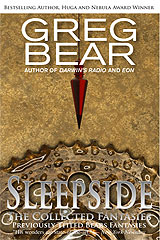
I'm reminded of the line delivered by Joseph Bologna in the motion picture comedy, The Big Bus. His character, Dan Torrance, once drove a bus through Donner Pass, and of course got snowed in. Desperation quickly set in among the passengers, and some odd recipes were resorted to. Torrance pleads that he did not know what was in the soup, adding, "One lousy foot, and they call you a cannibal for the rest of your life!"
Writing science fiction is one of those odd activities, like being a cannibal, that marks you permanently, even should you later become a vegan.
The odd relationship most people have with science—awed fascination, not infrequently dismay and distrust, and guilty dependence—guarantees a mixed reaction among the reading public: "You actually enjoy science? Writing about it, making it up? How interesting."
Their tone of voice tells you that you are now marked forever in their minds.
Science fiction explores the outer limits of the current Western paradigm, science; its playground is all that we know about the universe, and what we imagine we might eventually know.
Many of us, at one time or another, enjoy playing with previous paradigms—mind over matter, magic, dream logic, and so on. Literature does not play favorites; excellent stories have been written in all these areas.
A science fiction writer who writes fantasy, however, is regarded by some as an odd bird indeed. Write science fiction, become well known for it, and—well, your fantasy stories become almost invisible. All those times when you weren't a cannibal—simply forgotten.
Yet most of the great science fiction writers have written a great deal of fantasy, and I have, as well. But prejudices and snobbery on both sides of the fence have grown in the past ten or fifteen years.
I've never thought of my fantasy stories as dabbling or slumming. They represent an important part of my writing. Some of my very finest work is fantasy. The first novel I ever finished—an early version of what would later be published as The Infinity Concerto and The Serpent Mage—was fantasy. My second published novel, Psychlone, is a ghost story, heavily influenced by Stephen King. In real life I've even gone hunting ghosts in a world-famous hotel, just like Carnacki, though without his spectacular success.
I love fantasy.
Perhaps by gathering some of my fantasy in one volume, I can convince the world that I've had at least a few moments when I was not a cannibal.
But I won't bet on it.
Being a writer of science fiction is just so odd.
Thank goodness.